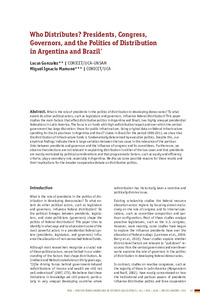Por favor, use este identificador para citar o enlazar este ítem:
https://repositorio.uca.edu.ar/handle/123456789/17078| Campo DC | Valor | Lengua/Idioma |
|---|---|---|
| dc.contributor.author | González, Lucas Isaac | es |
| dc.contributor.author | Mamone, Miguel Ignacio | es |
| dc.coverage.spatial | Argentina | es |
| dc.coverage.spatial | Brasil | es |
| dc.date.accessioned | 2023-09-07T12:43:46Z | - |
| dc.date.available | 2023-09-07T12:43:46Z | - |
| dc.date.issued | 2015 | - |
| dc.identifier.citation | González, L. I., Mamone, M. I. Who distributes?: presidents, congress, governors, and the politics of distribution in Argentina and Brazil [en línea]. Revista Iberoamericana de Estudos Legislativos. 2015, 4(1). Disponible en: https://repositorio.uca.edu.ar/handle/123456789/17078 | es |
| dc.identifier.issn | 2179-8419 | - |
| dc.identifier.uri | https://repositorio.uca.edu.ar/handle/123456789/17078 | - |
| dc.description.abstract | Abstract. What is the role of presidents in the politics of distribution in developing democracies? To what extent do other political actors, such as legislators and governors, influence federal distribution? This paper studies the main factors that affect distributive politics in Argentina and Brazil, two highly unequal presidential federations in Latin America. The focus is on funds with high redistributive impact and over which the central government has large discretion: those for public infrastructure. Using original data on federal infrastructure spending for the 24 provinces in Argentina and the 27 states in Brazil for the period 1999-2011, we show that the distribution of infrastructure funds is fundamentally determined by executive politics. Despite this, our empirical findings indicate there is large variation between the two cases in the relevance of the partisan links between presidents and governors and the influence of congress and its committees. Furthermore, we observe that elections are not relevant in explaining distribution in either of the two cases and that presidents are mostly motivated by political considerations and that programmatic factors, such as equity and efficiency criteria, play a secondary role, especially in Argentina. We discuss some possible reasons for these results and their implications for the broader comparative debate on distributive politics. | es |
| dc.format | application/pdf | es |
| dc.language.iso | eng | es |
| dc.publisher | Universidade Federal do Rio Grande do Sul | es |
| dc.rights | Acceso abierto | * |
| dc.rights.uri | http://creativecommons.org/licenses/by-nc-sa/4.0/ | * |
| dc.source | Revista Iberoamericana de Estudos Legislativos. 4 (1), 2015 | es |
| dc.subject | FEDERALISMO | es |
| dc.subject | DESCENTRALIZACION | es |
| dc.subject | GASTO PUBLICO | es |
| dc.subject | ECONOMIA POLITICA | es |
| dc.title | Who distributes?: presidents, congress, governors, and the politics of distribution in Argentina and Brazil | es |
| dc.type | Artículo | es |
| uca.disciplina | CIENCIAS SOCIALES | es |
| uca.issnrd | 1 | es |
| uca.affiliation | Fil: González, Lucas Isaac. Consejo Nacional de Investigaciones Científicas y Técnicas; Argentina | es |
| uca.affiliation | Fil: González, Lucas Isaac. Pontificia Universidad Católica Argentina; Argentina | es |
| uca.affiliation | Fil: González, Lucas Isaac. Universidad Nacional de San Martín; Argentina | es |
| uca.affiliation | Fil: Mamone, Miguel Ignacio. Consejo Nacional de Investigaciones Científicas y Técnicas; Argentina | es |
| uca.affiliation | Mamone, Miguel Ignacio. Pontificia Universidad Católica Argentina; Argentina | es |
| uca.version | publishedVersion | es |
| item.languageiso639-1 | en | - |
| item.grantfulltext | open | - |
| item.fulltext | With Fulltext | - |
| crisitem.author.dept | Facultad de Ciencias Sociales | - |
| crisitem.author.dept | Instituto de Investigaciones de la Facultad de Ciencias Sociales (IICS) | - |
| crisitem.author.dept | Programa de Estudios sobre América Latina (PREAL) | - |
| crisitem.author.parentorg | Pontificia Universidad Católica Argentina | - |
| crisitem.author.parentorg | Facultad de Ciencias Sociales | - |
| crisitem.author.parentorg | Instituto de Investigaciones de la Facultad de Ciencias Sociales (IICS) | - |
| Aparece en las colecciones: | Artículos | |
Ficheros en este ítem:
| Fichero | Descripción | Tamaño | Formato | |
|---|---|---|---|---|
| who-distributes-presidents-congress.pdf | 381,05 kB | Adobe PDF |  Visualizar/Abrir |
Visualizaciones de página(s)
28
comprobado en 27-abr-2024
Descarga(s)
8
comprobado en 27-abr-2024
Google ScholarTM
Ver en Google Scholar
Este ítem está sujeto a una Licencia Creative Commons

